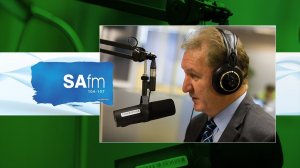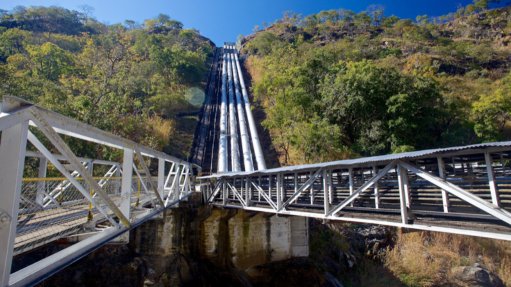On-The-Air (25/01/2019)
Every Friday, SAfm’s radio anchor Sakina Kamwendo speaks to Martin Creamer, publishing editor of Engineering News and Mining Weekly. Reported here is this Friday’s At the Coalface transcript:
Kamwendo: South Africa’s platinum outlook received a blow this week when cobalt was selected ahead of it for a new technology.
Creamer: It is a fantastic technology and it has been developed by an Israeli-Australian company. It means that you can have a water based fuel in your car, 60% water based. The hydrogen that you need to create the electricity is actually produces on demand in the car, which is not something we have been imagining, because we imagined that we would actually put hydrogen into the car.
This is a water based fuel, 60% water with boron in it and it produces the hydrogen and then the electricity to drive your car. It is a fuel cell development and we have always said that the best catalyst for fuel cells is platinum, but they have decided that platinum is a bit too expensive even though it is so low priced and they have opted for cobalt.
This is a terrible blow to South Africa, because this could be the answer to a maiden’s prayer as far as our locomotion and cars are concerned and how we drive the electric cars. This is the most advanced and can take you the furthest with the cheapest cost, because this fuel is also recycled. What are we doing about cobalt ourselves? The allegation is that our pyrometallurgical process, and pyro for the Greek word is fire, we have got a hot way of producing and getting our platinum put into shape when we process it.
They say, the allegations are claiming, that we destroy our cobalt during that process and that there is a hydrometallurgical process that we could use that would save the cobalt. The economics of that might be harsh. In the meantime, what have the Australians done? They have just announced the opening of a cobalt mine. So, it is not only the DRC that is supplying this, but the Australians also want to supply cobalt. I hope that we can eventually prove that platinum is the better metal.
Kamwendo: Richards Bay Coal Terminal (RBCT) has again proved how well business and government can combine for the good of the South African economy.
Creamer: It is a model. I was down there again yesterday, and this company is transformed. It is progressive. It is always striving to do better and it is consistent at the leadership level. When the leadership changed the baton is passed on.
We saw Mike Teke pass on the chairpersonship to Nosipho Siwisa-Damasane. Then we saw Nosipho pass on the CEO ship to Alan Waller and we saw Alan Waller pass on the management of the finance to Casper Mbuyazi. Now, we have got this fantastic model of transformation, but also a fantastically efficient, safe and cost effective business, which shows you that government and private-sector can really work together. What do we have here? We have Transnet that brings the coal.
We have business private sector, RBCT, which sorts out that coal, puts it into grades and gets it on to the port. We have then got the government National Ports Authority that takes over. What does all this do? It wins global awards. When they have hardship like bad weather, there were 36 days cut out of the cycle in 2018, do they start weeping and saying we can’t export? No, they make plans to catch up, because they are linked to the world. They have got to put South Africa’s best foot forward and that is what they are doing.
What did they do? They exported 73,4 million tons of coal out in 2018 and we see most of it going to Asia. 81% of it going to Asia, a big lot going to India, Pakistan, South Korea, but it is also going to Holland, Spain, Egypt and other parts of Africa and South America showing how well South Africa can do. This is a model for us and we could make sure that we get orderly leadership change, transformed leadership change and demographic leadership change.
Kamwendo: The World Economic Forum has highlighted the obstacles in the way of Africans doing business with Africans.
Creamer: We Africans need to do business with each other, but we get barrier after barrier. Intra-Africa trade should be promoted, but in fact, intra-regional trade is only 12% of totally trade in the continent. Now, The World Economic Forum is saying, come on Africans, you want to achieve a single market in Africa, this will be what looks like the biggest single market free trade area, but you have got even non-tariff barriers, never mind tariff barriers.
You have got visa barriers, work permit barriers, people can’t move in their own continent. You have got 54 countries that each do their own thing, but you have also got big regions. Use those regions. You have got the West-African Ecowas region with 13 countries. You have got the SADC, South African Development Community, with 14 countries. You have got the East African Community with 6 countries. The easiest way to get going is with 33 countries together where you can take the boundaries down and start working together.
You can have value chain that the one country makes one part of the product, the other country makes the other part. Let them go through the borders and have free access. That is the way you will create wealth. The plea is that they must take down the barriers particularly, initially easily, the non-tariff trade barriers. I hope there is some response to this, because we could be the next China after China, but not if we put up barriers for ourselves.
Kamwendo: Thanks very much. Martin Creamer is publishing editor of Engineering News and Mining Weekly.
Article Enquiry
Email Article
Save Article
Feedback
To advertise email advertising@creamermedia.co.za or click here
Press Office
Announcements
What's On
Subscribe to improve your user experience...
Option 1 (equivalent of R125 a month):
Receive a weekly copy of Creamer Media's Engineering News & Mining Weekly magazine
(print copy for those in South Africa and e-magazine for those outside of South Africa)
Receive daily email newsletters
Access to full search results
Access archive of magazine back copies
Access to Projects in Progress
Access to ONE Research Report of your choice in PDF format
Option 2 (equivalent of R375 a month):
All benefits from Option 1
PLUS
Access to Creamer Media's Research Channel Africa for ALL Research Reports, in PDF format, on various industrial and mining sectors
including Electricity; Water; Energy Transition; Hydrogen; Roads, Rail and Ports; Coal; Gold; Platinum; Battery Metals; etc.
Already a subscriber?
Forgotten your password?
Receive weekly copy of Creamer Media's Engineering News & Mining Weekly magazine (print copy for those in South Africa and e-magazine for those outside of South Africa)
➕
Recieve daily email newsletters
➕
Access to full search results
➕
Access archive of magazine back copies
➕
Access to Projects in Progress
➕
Access to ONE Research Report of your choice in PDF format
RESEARCH CHANNEL AFRICA
R4500 (equivalent of R375 a month)
SUBSCRIBEAll benefits from Option 1
➕
Access to Creamer Media's Research Channel Africa for ALL Research Reports on various industrial and mining sectors, in PDF format, including on:
Electricity
➕
Water
➕
Energy Transition
➕
Hydrogen
➕
Roads, Rail and Ports
➕
Coal
➕
Gold
➕
Platinum
➕
Battery Metals
➕
etc.
Receive all benefits from Option 1 or Option 2 delivered to numerous people at your company
➕
Multiple User names and Passwords for simultaneous log-ins
➕
Intranet integration access to all in your organisation



















